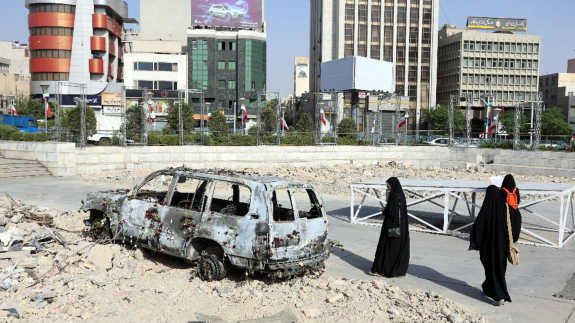🔥 Iran Launches Missile Strike
Doha | June 23, 2025 — In a sudden move that jolted the already strained Middle East region, Iran fired a series of ballistic missiles targeting a major U.S. military installation in Qatar. The attack was described as a direct message following the recent aerial bombardment of Iranian nuclear sites by American forces.
The military base in question, known for housing key U.S. operations and thousands of troops, was reportedly hit by a volley of medium-range missiles just after sunset. While Iranian media claimed that at least six missiles reached their mark, authorities from the U.S. and Qatar both denied any significant damage, stating that the incoming threats were intercepted mid-air with advanced defense systems.
Witnesses in nearby areas spoke of hearing loud booms and spotting missile trails across the dusky sky. Panic briefly spread among locals, but the situation was brought under control within an hour. Flights were temporarily grounded, and the airspace was closed as a precaution.
Interestingly, Iranian officials had issued a warning to Qatar shortly before launching the strike. This rare gesture allowed the Gulf nation to activate emergency protocols and clear its skies in time. The pre-notification seemed to be a strategic move—perhaps to prevent civilian casualties or wider regional outrage.
Despite the high tension, no casualties were reported. Officials described the strike as largely symbolic, though the implications could ripple far and wide. Many analysts believe Iran is showcasing its reach and readiness, not necessarily seeking all-out war. Yet, even symbolic strikes can misfire in the fog of geopolitical tensions.
In response, Qatar condemned the attack, calling it a violation of its sovereignty. Gulf neighbors, including the UAE and Saudi Arabia, also expressed concern, warning that the situation could easily spiral out of control if not checked through diplomacy.
From Washington, the U.S. administration took a surprisingly calm tone. The president addressed the nation shortly after the incident, acknowledging the strike but calling it “weak and anticipated.” He even thanked Tehran for giving advance warning—a rare admission in the middle of a conflict. The president then went on to declare a “complete and total ceasefire” between Iran and Israel, hoping to de-escalate what could have turned into a region-wide war.
Still, not everyone is convinced. Iran’s foreign ministry, while not dismissing the ceasefire, stated that any lasting peace would depend on whether Israeli aggression truly stops. Meanwhile, military bases across the Middle East have been placed on heightened alert.
As of now, things remain tense but controlled. Backchannels of diplomacy are working overtime, and Qatar is rumored to be playing a quiet mediator role. Civilian life is slowly returning to normal, though the streets are lined with a nervous energy.
This episode has shown just how delicate the balance is in this region. A single strike—even one with warnings—can bring the world to the edge of something far greater. Whether this incident becomes a footnote or the first chapter of something larger depends on what happens next.

